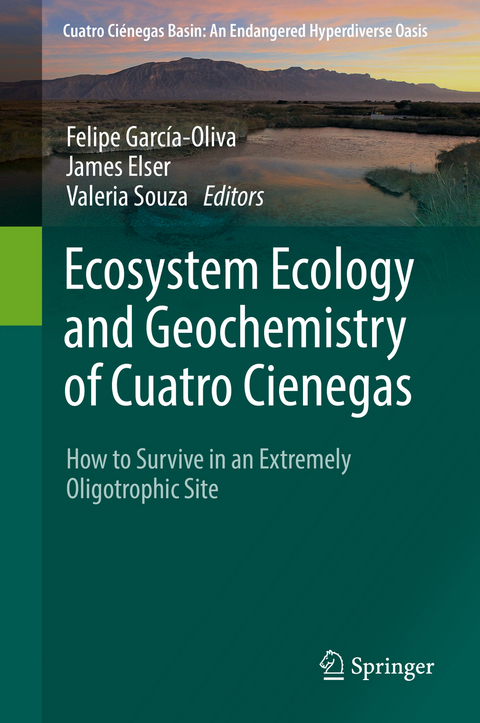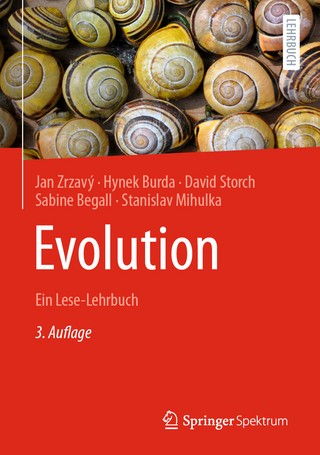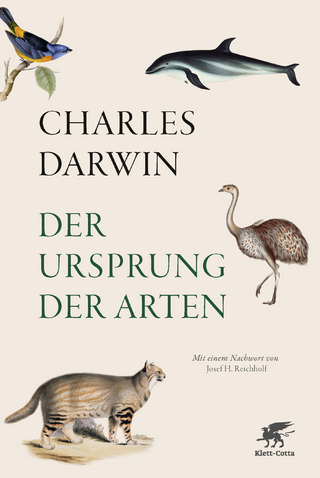
Ecosystem Ecology and Geochemistry of Cuatro Cienegas
Springer International Publishing (Verlag)
978-3-319-95854-5 (ISBN)
Felipe García-Oliva obtained his B.Sc. degree in Geography from the Philosophy and Letters Faculty, the National Autonomous University of Mexico (UNAM) in Mexico City. Then he obtained his Ph degree from Ecology Institute, UNAM. In 1994 he was hired by the Institute of Ecology, UNAM, where he is now a full Professor in the Instituto de Investigaciones en Ecosistemas y Sustentabilidad, UNAM at Morelia city. He has published 72 papers and 16 book chapters. He has been awarded level III in the National Researchers System of Mexico (SNI) and is a regular member of Mexican Academy of Sciences. Research Interests: Soil biogeochemistry; C dynamics on terrestrial ecosystems; link between soil bacteria biodiversity and soil nutrient dynamics. Chair of Science Steering Group of Programa Mexicano del Carbono (Mexican Carbon Program, 2005-2009) and General Coordinator of the same Program (2009-2011). James Elser is Bierman Professor of Ecology of the University of Montana and since March 2016 has been Director of the Flathead Lake Biological Station at Yellow Bay. He also holds a part-time research faculty position in the School of Life Sciences at Arizona State University. Trained as a limnologist, Dr Elser is best known for his work in developing and testing the theory of ecological stoichiometry, the study of the balance of energy and multiple chemical elements in ecological systems. Currently, Dr Elser's research focuses most intensively on Flathead Lake as well as mountain lakes of western Montana and western China. Specific studies involve observational and experimental studies at various scales, including laboratory cultures, short-term field experiments and sustained whole-ecosystem manipulations. Previous field sites have included the Experimental Lakes Area in Ontario, Canada; lakes of the Arctic and of Patagonia; lakes, forests, and grasslands of the upper Midwest; and desert springs in Mexico's Chihuahuan Desert. In recognition of his research accomplishments, Dr Elser has been named a Fellow of the American Association for the Advancement of Science (AAAS) as well as a foreign member of the Norwegian Academy of Arts and Sciences and has received the Lindeman Award and the G.E. Hutchinson Award of the Association for the Sciences of Limnology and Oceanography, the world's largest scientific association dedicated to aquatic sciences. Dr Elser holds a PhD from the University of California (Davis), an MS degree from the University of Tennessee, and a BS degree from the University of Notre Dame.
1. Carbon, Nitrogen and Phosphorus in Terrestrial Pools: where are the main nutrients located in the grasslands of the Cuatro Ciénegas Basin?.- 2. The terrestrial N budget of an endangered oasis.- 3. The effect of nutrients and N:P ratio on microbial communities: testing the Growth Rate Hypothesis and its extensions in Lagunita Pond (Churince).- 4. How to understand the effect of nutrients availability on the ecological role of filamentous microfungi: lessons from elemental stoichiometry.- 5. Life on a stoichiometric knife-edge: biogeochemical interactions and trophic interactions in stromatolites in Rio Mesquites.- 6. The sulfur cycle as the gear of the "clock of life": the point of convergence between geological and genomic data in the Cuatro Cienegas Basin.- 7. Towards a comprehensive understanding of environmental perturbations in microbial mats from the Cuatro Cienegas Basin by network modeling.- 8. The magnetotactic bacteria of the Churince Lagoon at Cuatro Cienegas Basin.- 9. Ecological adaptability of Bacillus to the extreme oligotrophy of the Cuatro Cienegas Basin.- 10. Bacterial siderophore-mediated iron-acquisition in Cuatro Cienegas Basin: a complex community interplay made simpler in the light of evolutionary genomics.- 11. Animal-mediated nutrient cycling in aquatic ecosystems of the Cuatro Ciénegas basin.- 12. How Agricultural Practices Modify Soil Nutrients Dynamics?.
| Erscheinungsdatum | 15.10.2018 |
|---|---|
| Reihe/Serie | Cuatro Ciénegas Basin: An Endangered Hyperdiverse Oasis |
| Zusatzinfo | X, 167 p. 39 illus., 22 illus. in color. |
| Verlagsort | Cham |
| Sprache | englisch |
| Maße | 155 x 235 mm |
| Gewicht | 427 g |
| Themenwelt | Naturwissenschaften ► Biologie ► Evolution |
| Schlagworte | autotrophy • carbon cycling • extreme environments • Nitrogen Cycling • oligotrophic environments • Phosphorus cycling • photosynthesis |
| ISBN-10 | 3-319-95854-2 / 3319958542 |
| ISBN-13 | 978-3-319-95854-5 / 9783319958545 |
| Zustand | Neuware |
| Informationen gemäß Produktsicherheitsverordnung (GPSR) | |
| Haben Sie eine Frage zum Produkt? |
aus dem Bereich


